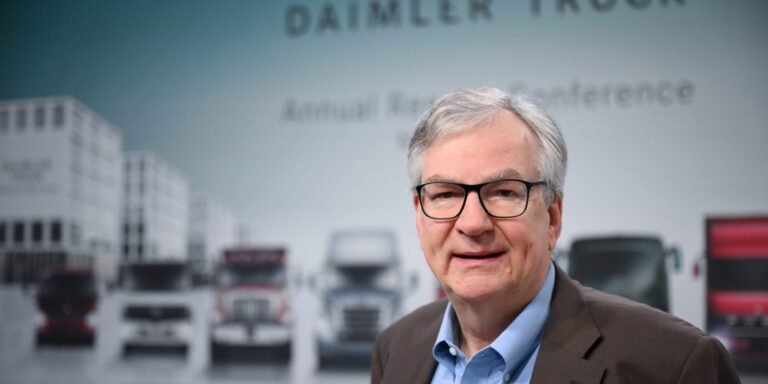The world’s largest commercial vehicle maker warned that slow progress in adding charging infrastructure threatens the shift to zero-emission trucking.
The lack of electric truck chargers in Europe and the United States “is my biggest concern,” Martin Daum, who heads Daimler Truck Holding AG, said in an interview. He cited the lengthy permitting requirements and challenges of installing megawatt-level charging stations that would require peak power demand in a small town. The German manufacturer reports first-quarter earnings on Friday.
Volkswagen’s Daimler Truck, Volvo and Traton subsidiaries are under increasing regulatory pressure to cut emissions, but sales of their electric trucks — including heavy-duty platforms like the Mercedes-Benz eActros 600 that can travel 500 kilometers (311 miles) on a charge — remain negligible. This is partly because of the charging gap, but also because battery-powered trucks are more expensive than comparable diesel models.
Daum said electric truck technology is progressing well and he is optimistic about price parity if regulators impose fees on carbon dioxide emissions. But he added that there should be greater support from governments to build high-speed chargers, especially along highways.
“The clock is ticking, and time is quickly running out,” the CEO said.
The Biden administration unveiled a roadmap in March aimed at boosting truck charging infrastructure along major U.S. routes, where Daimler Truck owns the Freightliner and Western Star brands. The move comes in response to growing concern from manufacturers who say there is a need for more support for charging stations and improved network and other infrastructure.
Across the United States, there are only 72 fast-charging ports capable of serving heavy trucks, most of them in California, according to Department of Energy data.
The European Union has adopted rules requiring the major road network to be equipped with heavy vehicle chargers every 60 kilometers by 2030, a density that should allow battery-powered trucks to better compete with diesel equivalents.
Daimler Truck, Traton and Volvo plan to spend 500 million euros ($534 million) to install at least 1,700 chargers in Europe, but Daum said the project is making only slow progress due to long approval processes and limited availability of green energy. The company has joined a similar project with BlackRock Inc. in the United States.
The three European manufacturers are no closer to meeting the lofty goals of clean trucks making up significant shares of their sales by the end of the decade. For example, Daimler Truck sold 3,443 zero-emission trucks and buses last year, representing just 0.6% of the total. The manufacturer has about ten zero-emission trucks and buses in its portfolio.





